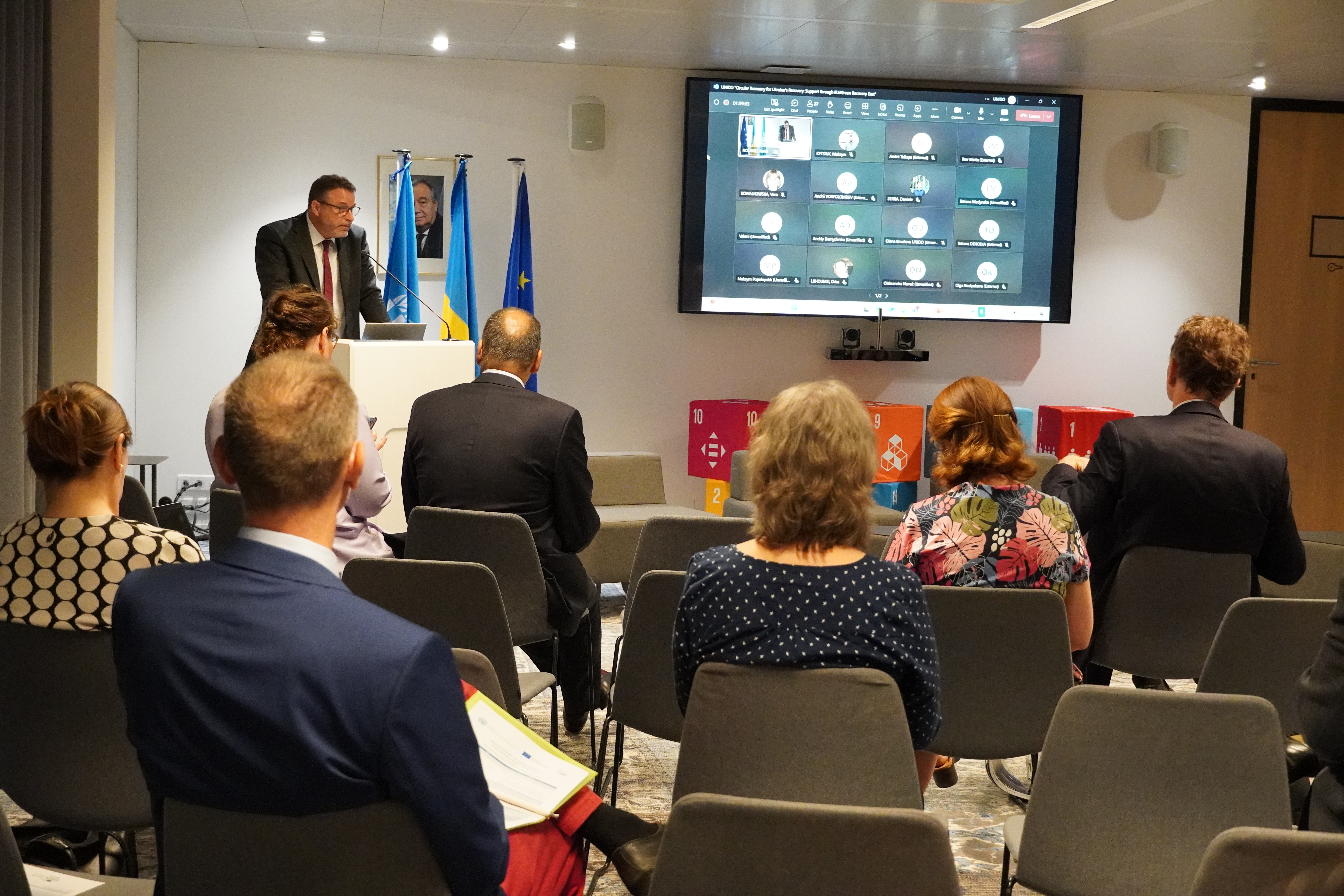Picture: Mr Thomas HAGLEITNER, Head of Unit at EU Directorate-General for Enlargement and Eastern Neighbourhood (DG ENEST)
What is the Circular Economy and Why Does it Matter?
The circular economy represents a fundamental shift from the traditional "take-make-waste" model to one where resources are kept in use for as long as possible, extracting maximum value before recovering and regenerating materials. For Eastern Partnership countries, this transition offers significant opportunities: reduced resource costs for businesses, new job creation, decreased environmental impact, and enhanced competitiveness in EU markets.
Building on Strong Foundations
The EU4Green Recovery East programme, with €21.3 million in funding for 2025-2028, represents the latest phase of EU support for sustainable development in the Eastern Partnership countries. Building on the success of previous initiatives like EaP Green and EU4Environmen-Green Economy—which helped establish policy frameworks, supported small and medium enterprises (SMEs) in going green, and introduced circular economy concepts— EU4Green Recovery East now focuses on practical implementation and scaling up successful practices.
The programme offers concrete support through digital tools that help businesses identify circular opportunities, demonstration projects that show real-world applications, expanded networks of Resource Efficient and Cleaner Production (RECP) Clubs for peer learning, and alignment with European standards to help local businesses access EU markets.
UNIDO (United Nations Industrial Development Organisation) is one of the implementing partners of the EU4Green Recovery East programme and is working to promote the circular economy in Eastern Partnership countries. To know more, read the leaflet about Circular Economy activities in the frame of the EU4Green Recovery East programme.
International Recognition and Knowledge Sharing
The UNIDO exhibition booth showcased practical results from previous EU-funded programmes at the World Circular Economy Forum 2025 (May 13-14), a premier global event where business leaders, policymakers, and researchers gather to accelerate circular economy solutions. The presented materials demonstrated how circular thinking has been successfully integrated into business operations and government policies across the Eastern Partnership countries with EU support.
A virtual acceleration session on May 15, co-organized by UNIDO with the Economic Cooperation Organization, emphasized the importance of regional cooperation in achieving sustainable transitions—a key principle underlying EU4Green Recovery East’s approach.
Armenia: Circular Thinking at the Agenda of Yerevan Dialogue
During the Yerevan Dialogue 2025, senior UNIDO representatives met with Deputy Ministers from Armenia's key ministries on May 27. These high-level discussions focused on how EU-supported programmes can accelerate Armenia's industrial modernization and green transition. The meetings built on previous successes in helping Armenian SMEs adopt eco-friendly practices and integrate circular economy principles into their operations.
Moldova: Green Industrial Transition
Moldova's experience illustrates how circular economy principles can transform industrial zones. Starting with a May 8 workshop on applying circular practices in industrial parks, the initiative culminated in a June 26 event in Chisinau showcasing concrete results from the Global Eco-Industrial Parks Programme (implemented by UNIDO, funded by the Swiss government)? which builds on previous feasibility studies at Tracom Industrial Park and Valkanes Special Economic Zone also discussed during the events. Here, UNIDO focuses on practical solutions like waste prevention through better design, industrial symbiosis (where one company's waste becomes another's input), and resource sharing among businesses.
Under EU4Green Recovery East, Moldova will benefit from detailed industrial waste mapping, digital tools for tracking resource flows, and enhanced business networking opportunities. The programme will also address emerging environmental challenges like pharmaceutical residues and microplastics in industrial wastewater—issues particularly relevant as Moldova aligns with EU environmental standards.
Ukraine: Recovery Through Circular Economy
Ukraine demonstrates how circular economy principles can support post-conflict reconstruction. Two major events in June showcased this potential:
On June 4, government officials and international partners gathered in Vienna at UNIDO headquarters to discuss Ukraine's Green Industrial Recovery, with EU4Green Recovery East positioned as a flagship initiative for sustainable reconstruction.
This was followed by an EU-UNIDO partner event in Brussels on June 23 during EU Green Week “Circular Economy for Ukraine’s Recovery”, where over 80 stakeholders—including business leaders, government officials, and civil society representatives—explored how circular economy can drive Ukraine's recovery.
A key document for that is UNIDO's strategic foresight study identifying five priority sectors for circular transformation: construction (crucial for rebuilding), food & beverages, electronics & ICT, plastics & packaging, and waste management.
The EU4Green Recovery East programme will support implementation of Ukraine's national Circular Economy strategy and establish a Circular Economy Hub to facilitate knowledge exchange within country and with the EU partners—a model that will be replicated in other Eastern Partnership countries.
The EU4Green Recovery East programme's country-specific approach shows how circular economy principles can be adapted to different national contexts while maintaining coherence with broader EU environmental and economic objectives. As the programme continues through 2028, it positions Eastern Partnership countries to become more competitive in green markets while contributing to global sustainability goals.


